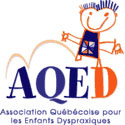
Remember, children who walk and talk later that others do not all have dyspraxia but keep in mind to listen to your maternal instincts! Do not hesitate to call a neuropediatrician rather than your family doctor if you are having serious doubts about dyspraxia. The earlier the diagnosis, the earlier your child will have access to rehabilitation methods. Ideally, the diagnosis should be made before starting school.
In concrete terms...
- Children with dyspraxia have an incredible memory, especially for things they learn with their heart or by heart! However, their memory is divided into different boxes that are not interconnected. In other words, the manner in which their knowledge is stored is completely disorganised.
- Children with dyspraxia tend to remember only the last thing they heard or recently discussed. These children will also integrate recent knowledge into their own personal life. For example, if your child reads a book on figure skating, he will probably answer that it is his favorite sport if you ask him the question.
- Children with dyspraxia cannot manage, organize or make coherent links with information they learn. For example, he may know a story by heart but he cannot tell the story in a logical sequence.
- He will get lost in his writing. The story is complete in his mind but he cannot put in into words on paper.
- You will need to be patient with a child suffering from dyspraxia. He will have a tendency to express ideas in a disorganized manner, meaning that you will have to put things in order yourself and ask questions if necessary.
- On a social or emotional level, these children are very fearful and easily destabilized by a new situation. He will have a low tolerance to frustration. He will have a tendency to lack verbal or physical censorship and might act inappropriately at times.
A doctor, most often a neuropediatrician, makes the diagnosis for dyspraxia. Furthermore, an evaluation with other occupational therapists and in neuropsychology can all be helpful in confirming the diagnosis and guiding the treatment plan and rehabilitation.
This article was written by Sylvie Breton, vice-president of the Quebec association for children with dyspraxia (Association québecoise pour les enfants dyspraxiques, AQED). Click here to read her blog. It contains many articles on dyspraxia (in French only).
 Association québécoise pour les enfants dyspraxiques (AQED)
Association québécoise pour les enfants dyspraxiques (AQED)
C.P 26024
Sherbrooke (Québec) J1G 4J9
Téléphone : 819-829-0594
Email :dyspraxieaqed@hotmail.com

